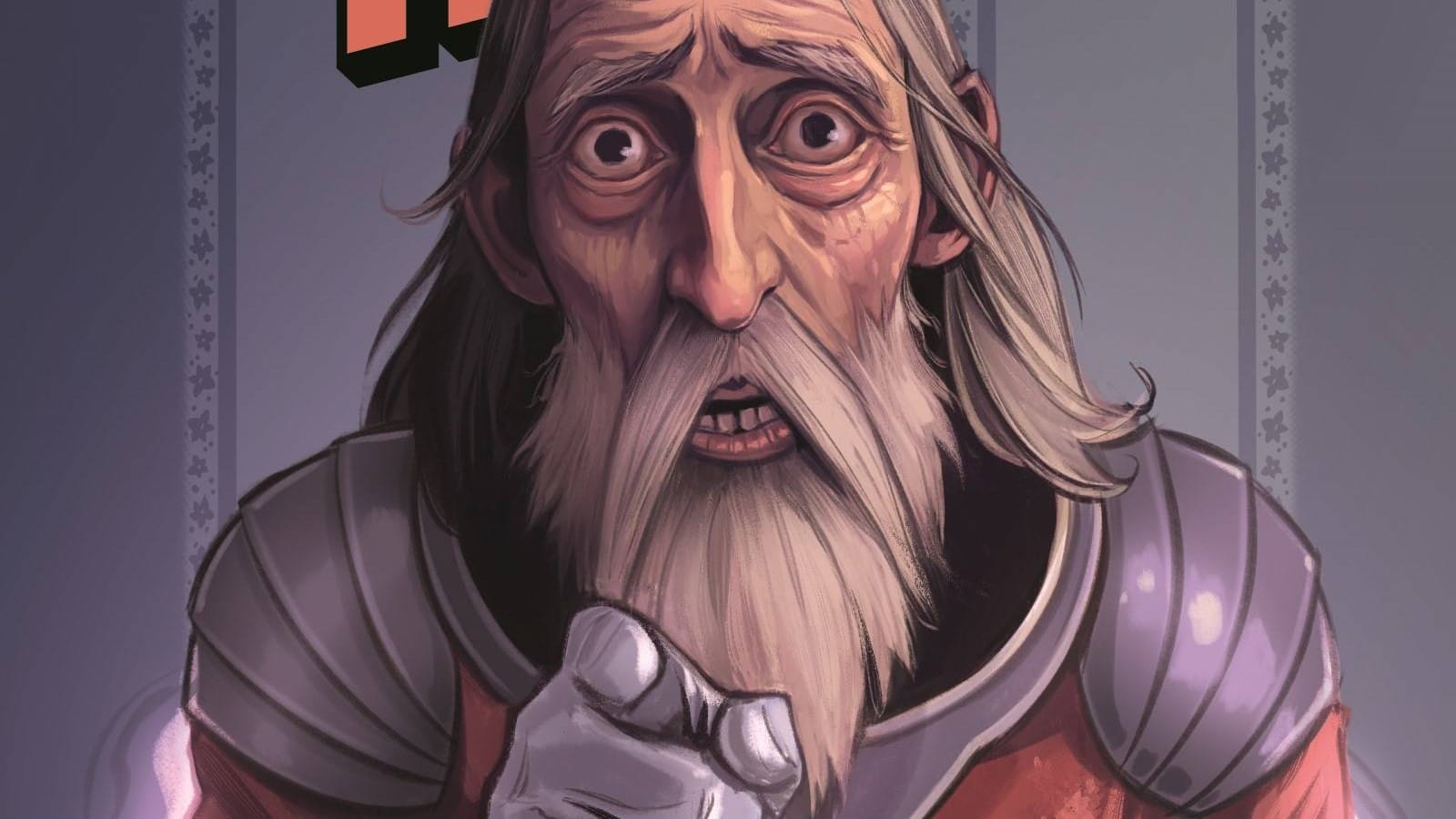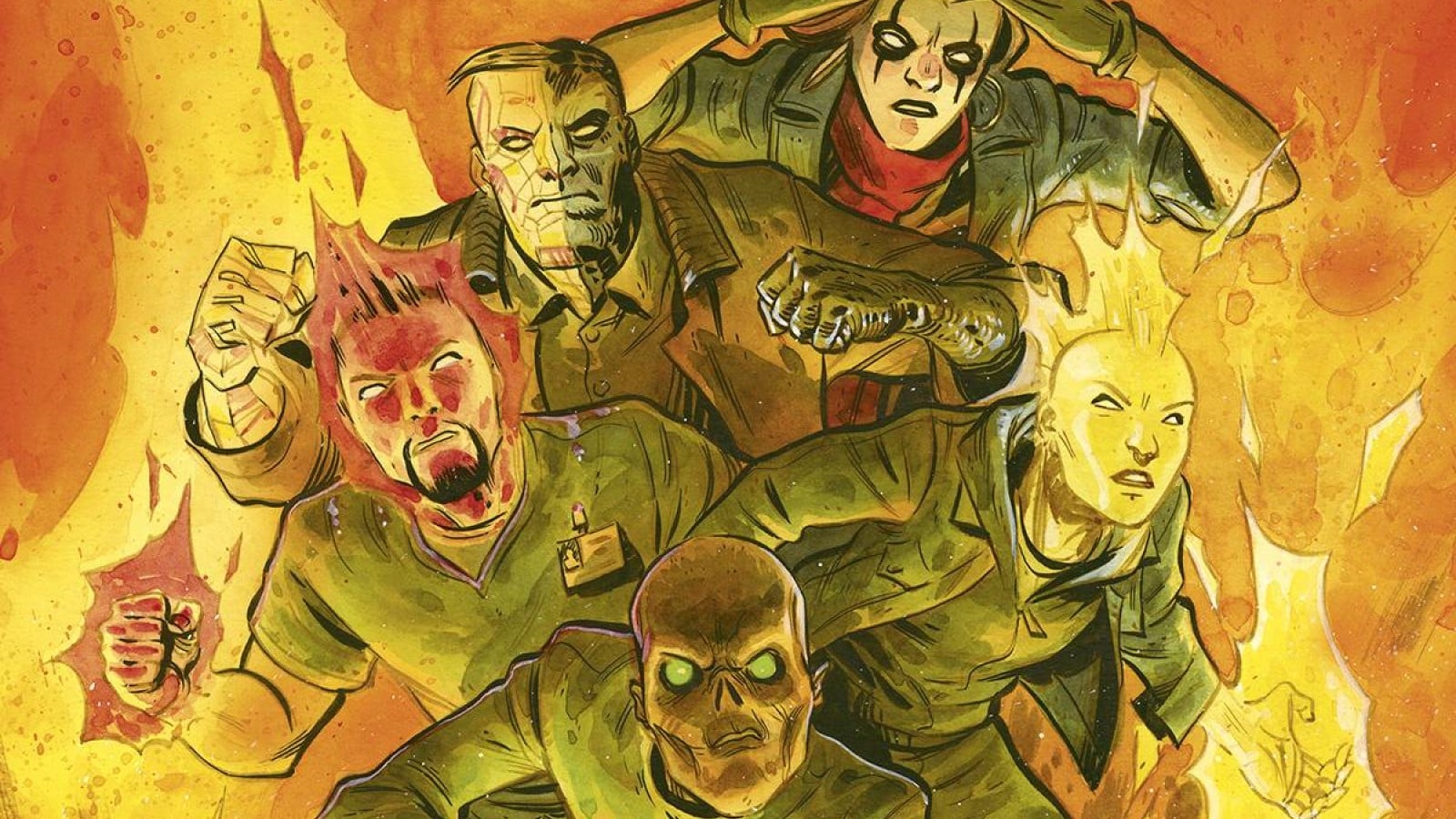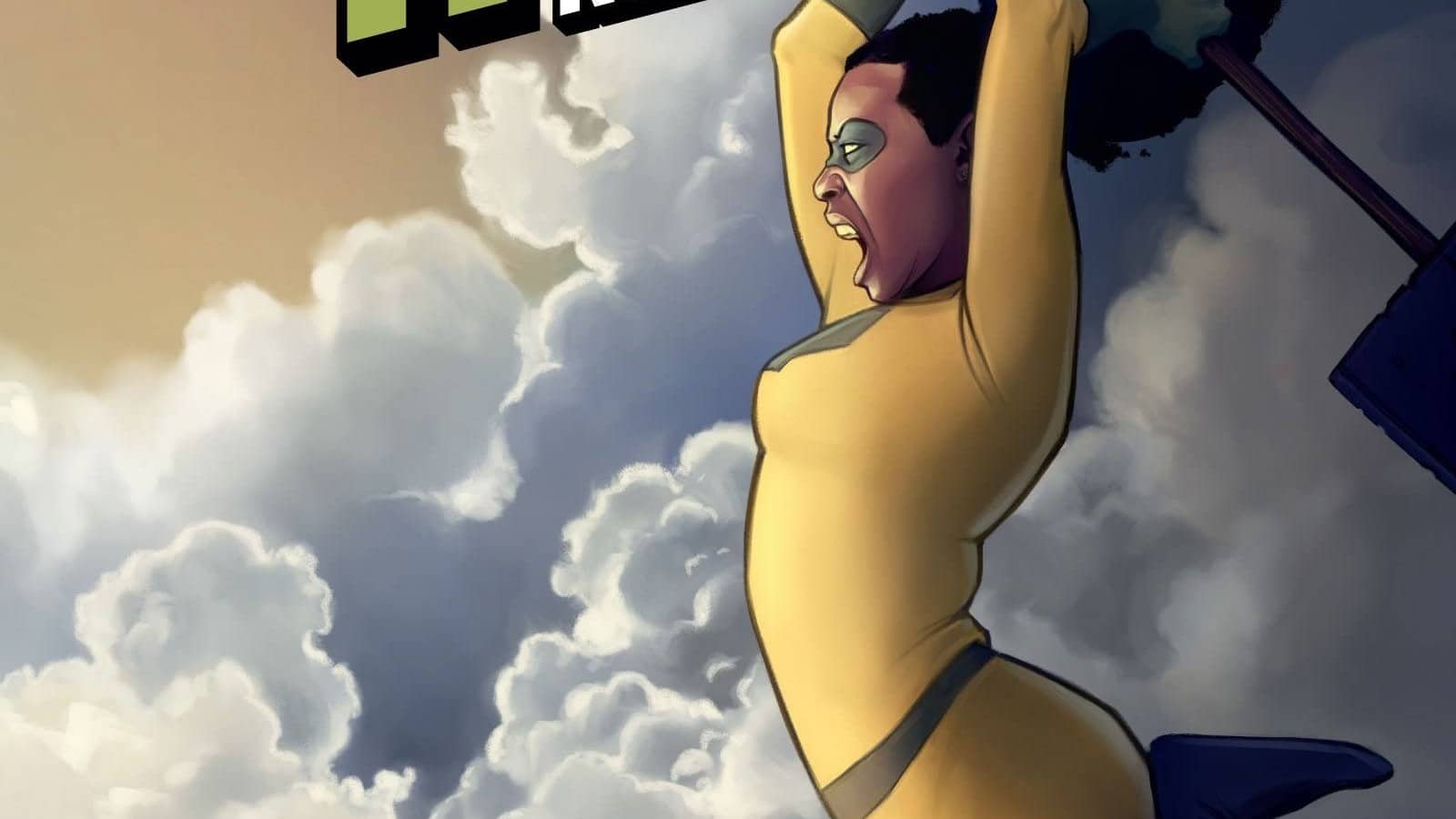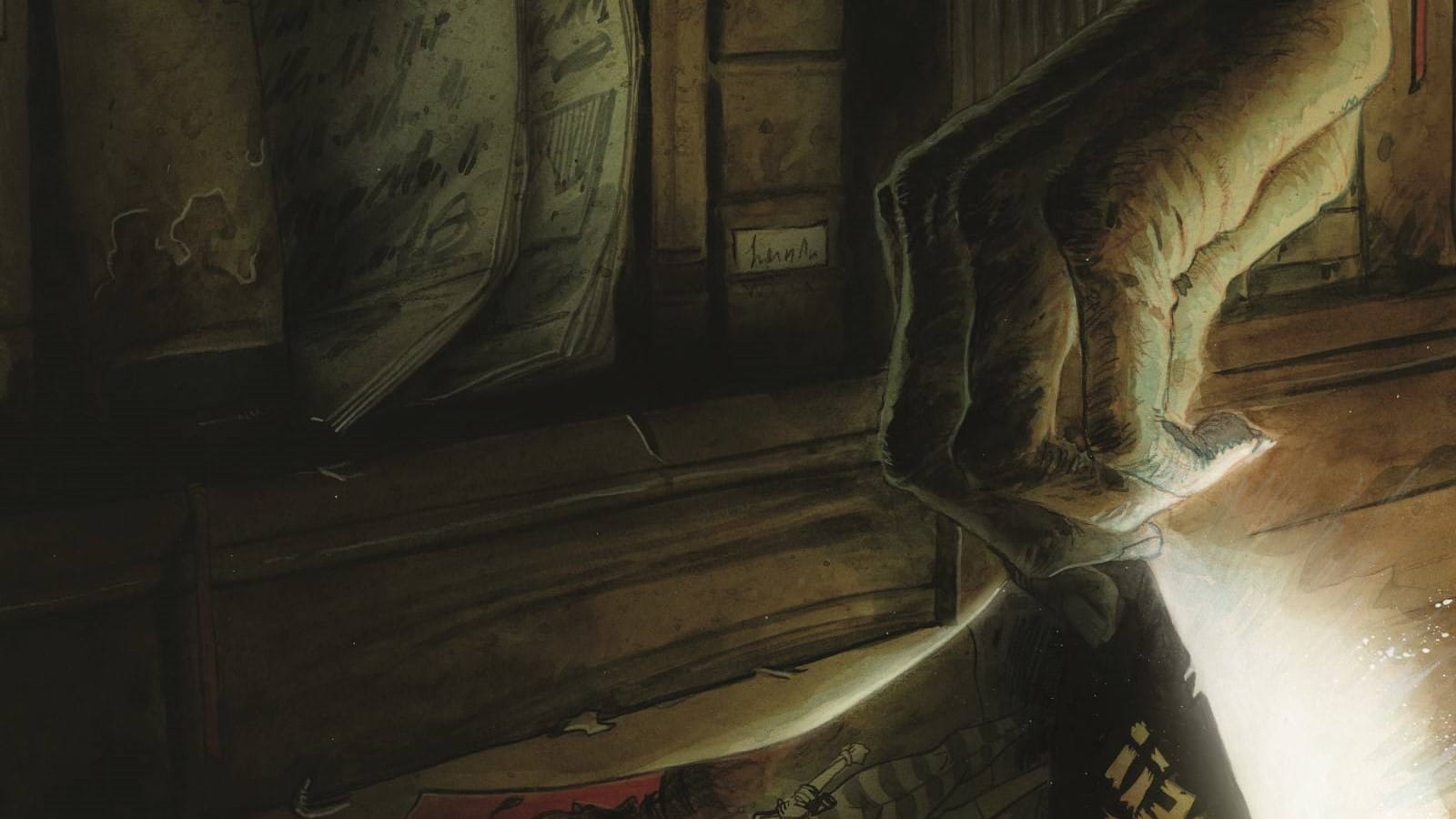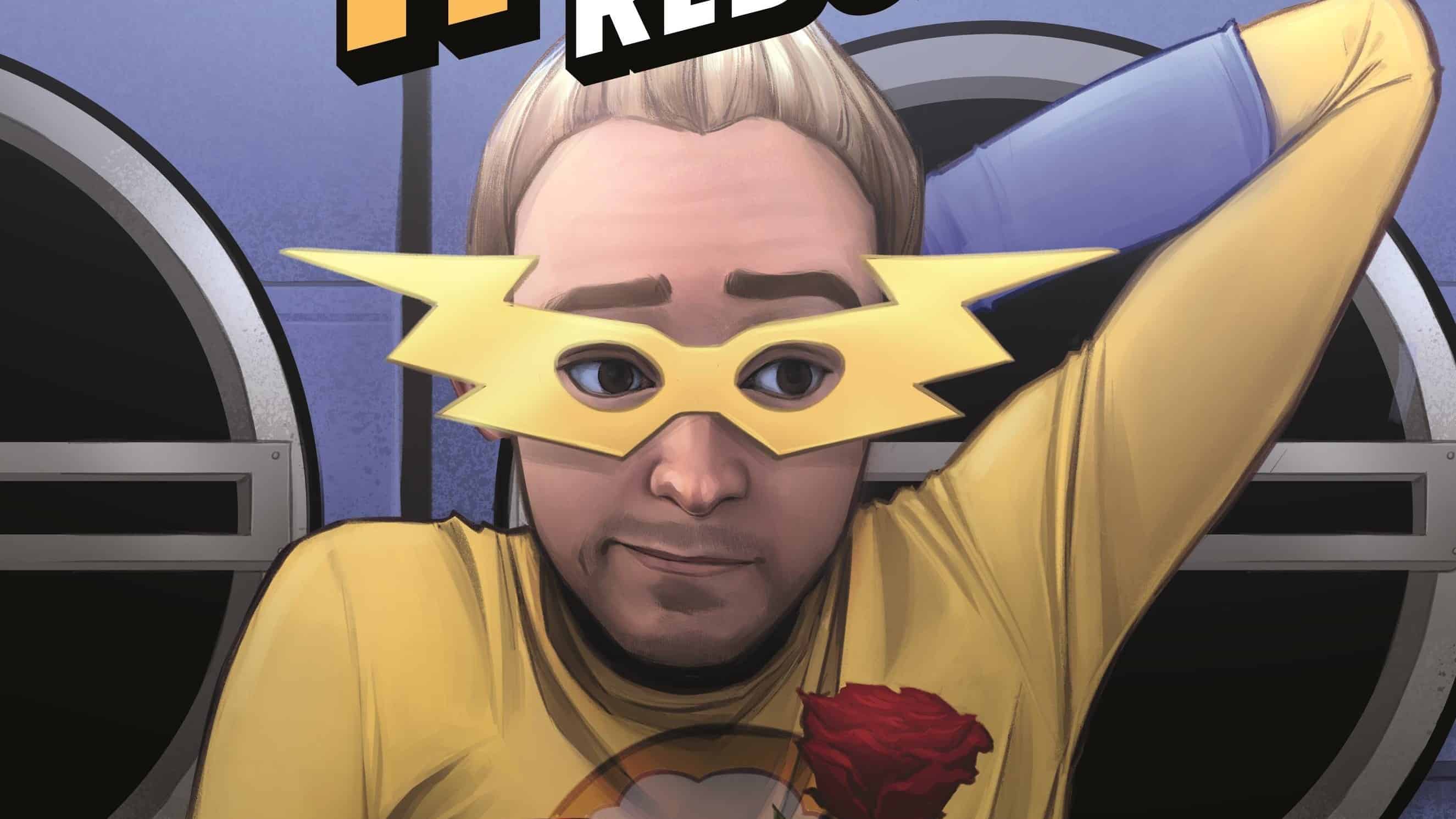In Black Hammer: Reborn #4, Colonel Weird brings Lucy on a trip through the Para-Zone, and the sins of her past; written by Jeff Lemire, drawn by Caitlin Yarsky, colored by Dave Stewart and lettered by Nate Piekos.
Meanwhile, in Unbelievable Unteens #3, the newly reunited no-longer-teens remember the White Wraith Saga that tore the team apart; written by Jeff Lemire, and drawn and lettered by Tyler Crook.
Mark Turetsky: It seems like the big mysteries of our heroes’ past are all getting answered on the same day, Vishal!
Vishal Gullapalli: It was a big surprise for me, but yeah — we’re getting a lot of backstory exposition this week. What’s wild to me is that it doesn’t feel like exposition at all, it feels almost like a climax. Or at least, a radical shift in our understanding of both books.
The Ghost of Christmas Past, Present and Yet to Come

Mark: Let’s start with Black Hammer: Reborn. First off, what did you think of Colonel Weird making his grand reappearance?
Vishal: It feels, to a small degree, like he never left. He’s coming in with all the confusing and bizarre ideas and ways of speaking, knowing more than everyone else but less than would be convenient, and he serves to infuriate every character forced to interact with him. It’s great; he’s a walking character development tool. This time it feels a bit like he forced Lucy to experience her world the way he experiences his, and I love that — the Cosmagog miniseries gave us great insight into how he perceives reality, so it feels more meaningful when he drags Lucy along here.
Mark: And I find with his manner of speaking, I really need to go over and parse the potential meanings of everything he says. So, for instance, when he says, “They’re not perfect … but they’re yours,” a line that is repeated later in the issue by Lucy, we don’t really know if he’s telling her what she’s told him later on (because he perceives time non-linearly), or if she’s parroting him, but he’s apparently trying to remind her of her love for her family. He literally says, “You will need to remember … remember it all.” But at the end of the issue, when he’s about to zap them with his raygun, and Lucy is begging him not to, he says, “Why? You saw — you saw all of them. You know what they are.” It’s as if he doesn’t understand how she could love them after she’s seen all of their faults, even though he’s told her the “imperfect, but yours” line earlier.
Vishal: Yeah, I found that specific scene really fascinating — Weird seemed to not understand at all how his own words convinced Lucy to stick with her family, as if his words were meant to have a different effect. The only other effect I can think those words would have is making Lucy fall into despair over herself and everything she considers her own — “They’re not perfect … and they’re yours” would maybe have done that.
The scenes that specifically caused Lucy to beg Weird to stop were also somewhat interesting — or at least, one of them was. There’s the one of her husband cheating on her, which we knew about, and of her daughter doing drugs, which is pretty normal “troubled teen” stuff. But evidently her son has some sort of powers and used them to hurt a cat? I’m curious if that will play in at all — this wouldn’t be the first time Lemire’s written about superpowered parents with one superpowered child and one “normal” one.
Mark: Yeah, that thing with Joseph and the cat takes a real turn. I suppose they’re powers that he inherited from his father. But it’s the vignette that veers the most sharply. In the first two panels, he’s playing nicely with the cat, and in the final one he’s torturing it. It starts out the most wholesome, and it just steps the furthest outside the range of acceptable behaviors. It really makes me worry about the possibility of him inheriting the hammer eventually, and using it for the sake of cruelty.
That’s one part of what Colonel Weird shows Lucy. The other part reveals some of the big secrets this series has been teasing us with for the past three issues: Doctor Andromeda has gone bad, and Lucy killed him.
Vishal: And not just your average “gone bad” superhero, he’s actively working to bring back the Anti-God! This is something that can only be depicted as cartoonishly, maniacally evil for now, as Doctor Andromeda speaks as if he’s the sole member of a cult. I’m honestly really curious what could drive anyone to want to bring back Anti-God, who from everything we’ve seen about this universe is nothing but its destruction. So Lucy kills him, because she genuinely doesn’t know how else to stop this plot, and puts down the hammer for good. It’s nothing super surprising, the most shocking part being Dr. Andromeda’s ultimate goal, but what is shocking is where the issue goes afterward.
Mark: It’s a big turn. After reading the Doctor Andromeda mini, it’s genuinely shocking that he’s gone so bad. As you say, he seems almost cartoonishly bad here in the flashback, but I don’t think he’s trying to summon Anti-God without a good reason. They also seem to have fixed the hair color issue that threw us off in issue #1.
As for what happens after the flashback to the murder, Colonel Weird zaps Lucy’s family. With a “SHRACK,” they’re reduced to ashes. Now, on my second read, I noticed on the first page he says, “This is when I take them,” so I was definitely thinking this was a fakeout, that they’re his hostages somewhere. Buuuuut … those ashes really tell a different story.
Vishal: Yeah, “take them” could easily just mean “from you,” implying their death, but I do think you’re right that it’s a fakeout. This is superhero comics, and Colonel Weird is, above all, still a superhero. Plus, he says Lucy told him to do this, so obviously things should turn out OK in the future. Not that that erases Lucy’s turmoil over losing her family at all, but there is some light at the end of the tunnel.
Mark: As Doctor Andromeda says with his last breath: “Heroes don’t kill.” Black Hammer has never been a grimdark deconstruction of superheroes, so, with the big revelations in this issue, it only opens the door to more questions.
Unteens, Unassemble!

Mark: Moving onto Unteens, we get some more flashbacks to troubled teens. They’re getting up to trouble in the way that students at a private boarding school do: hooking up with each other, opening portals to Hell, that kind of thing.
Vishal: This book is so Teen Titans it almost hurts. Everyone’s allowed to curse (much like the live action show), and the names are swapped, but it’s reaching a point where one can draw 1:1 parallels between characters. I think it’s fun, but the best word to describe it is “blatant.” And of course, just enough Doom Patrol thrown in there to keep it distinct.
But at last, we’ve gotten to witness the White Wraith Saga. It’s tragic in all the right ways, and a fitting end to a group of teen superheroes in the Black Hammer universe. How’d you feel about Jane’s planned ending to her ongoing comic series?
Mark: First off, I find it hilarious that Carlos refers to the actual events of their teenhood as “the White Wraith Saga.” It’d be like someone saying, “Hey, remember during Secret Wars (2015) when Doom was in charge of a collapsed multiverse?” I mean, you might refer to some big issue at your work as a “saga,” but only hyperbolically.
And it’s funny you bring up Teen Titans, because I have read none of it, and these read to me as X-Men analogues more than anything. Not that you’re wrong, of course, but it’s reminiscent of the characters in Kieron Gillen and Caspar Wijngaard’s Peter Cannon: Thunderbolt mini, where each character was an amalgam of a Charlton/Watchmen character and an Avenger. They’re neither, they’re both!
As for the “saga” itself, really what interests me the most is comparing the big, operatic feels of a team of teens, and the just-as-deeply felt drama between the adults. They still get into it, but they have their hormones a bit more under control.
Vishal: “They’re neither, they’re both” is really the Black Hammer mantra at this point. Carlos’ callousness to the situation is something that really intrigues me, though — he’s the one who tells the team Doc’s dead, and seems the most compelled to prevent the band from getting back together. It feels as if he’s hiding something. He’s visibly got a lot of pent-up anger and frustration with Jack and Jane, and that’s gotta be leading to something. I’m just not sure if it’s something sinister or something like “trying to protect everyone.”
Snapdragon’s sacrifice is exactly the kind of tragedy to pull the team apart, but I’m most curious to see if the Whitewraith has some real-world persona like everyone else. Is he just as present as the Unteens? Or are we going to have some (honestly dull) big scene of everyone suiting up again to fight the giant demon? I hope I’m not alone in saying I find the adult, civilian versions of the Unteens far more interesting than their teenage superpowered selves.
Mark: And I think that’s kinda the point. The adult versions are lovingly painted, the teen versions are your standard pencil-and-ink deals. The teens’ emotions are bigger and more jagged. It’s a unity of medium and message here. One thing about Black Hammer comics, they tend to avoid that big suiting up trope, whether it’s the Quantum League avoiding the big fight altogether, or the Farm Team not fighting Anti-God and returning to their farm dimension willingly. We’re only one issue from the end, and I have no idea how this will play out, which is a testament to Lemire and Crook’s storytelling here.
Dispatches from the Para-Zone
- Carlos worrying about Straka and Strobe hooking up while Snapdragon is in a coma is peak teen superhero comic.
- There’s an editorial note that refers to a “Cabin of Horrors Summer Special” which I believe is a silly reference to the 2019 Free Comic Book Day story “Horrors To Come,” but that story doesn’t feature the Unteens meeting Madame Dragonfly, only Jack Sabbath meeting her and being mortified that his memories of the team are missing. I’m wondering if this might portend the Unteens showing up in the forthcoming Madame Dragonfly miniseries from Lemire and Dean Ormston.

